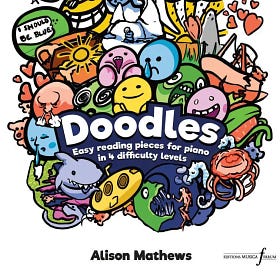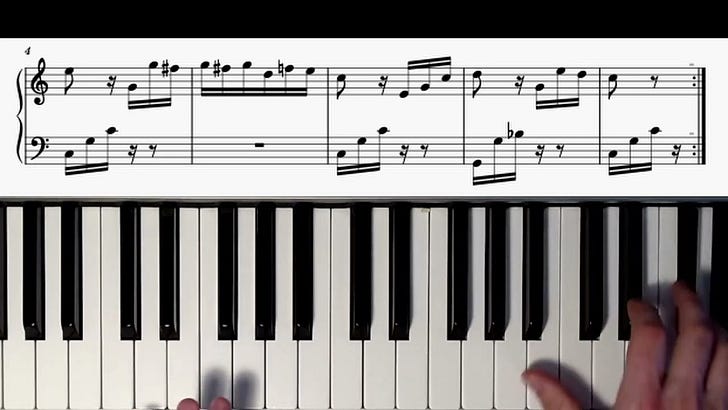Piano Creativity digest — 22rd March 2024
What I've been reading and writing this week
Firstly, thanks for subscribing! I'm thrilled to see so many new subscribers.
I want this to be useful to you, so I’ve created a really short survey that’ll help me tailor what I write to your needs. It’s just 3 questions and should take no more than 5 minutes to answer. Please take it!
What I’ve written this week:
Doodles by Alison Mathews
Alison Mathews’ Doodles: Easy Reading Pieces for Piano in 4 Difficulty Levels is an extremely effective resource for teaching musicianship and creativity. I’ve used it many times, and it’s a big hit with my students. What differentiates Doodles from the many other note-reading books out there is that it is filled with creative suggestions for how to chan…
My most-used elementary improvisation book might surprise you!
It’s a relatively obscure elementary-level publication from Nancy & Randall Faber’s sprawling Piano Adventures series called “Scales and Chords Book 1: Five Finger Scales and Chords”. Improvisation is mentioned on the cover just once, near the bottom of a list of topics covered. So why this book? (And why have I not chosen one of Forrest Kinney’s wonder…
Arabesque-euqsebarA
This twist is useful in two ways: it’ll help your student practise some of the position changes in Burgmüller’s popular Arabesque, and it’s also a great introduction to the idea of music played backwards (the technical term is “retrograde”).
A modal twist on Für Elise
Sometimes you can have too much of a good thing, and that’s when a creative twist on the original can recapture your interest. Here’s a twist on Für Elise you probably haven’t thought of: it is really easy to transpose the first eight bars into the Mixolydian mode. Here’s what you do:
Invisible burdens
Sometimes our students enter our studios with the weight of the world on their shoulders. To use two examples from my studio right now, they might be caring for a critically-ill family member, or being bullied. Like our students, we may also have burdens to carry.
Turn the critic off
Part of the work we do when we practise is self-criticism. We need to practise a lot, so we spend a lot of time criticising ourselves. But self-criticism can be deadly for creation. It prevents us…
What I’ve enjoyed this week:
Andrew Eales wrote a thoughtful post about how to get back on track when you’re feeling lost in your piano development that reminded me that we sometimes have a tendency to neglect parts of our development because we’re too focused on one goal. He mentions that creative exploration is a good way to re-find our pianistic selves
On a related topic, I really enjoyed listening to Amy Chaplin’s Piano Pantry podcast on “What to do when your students don’t practice”. Amy’s point is that we have a tendency to view lessons when a student hasn’t practised as a bit of a trial, but actually they’re a great opportunity to do some broader exploring — including through improvisation
Composer Wendy Stevens wrote a couple of interesting posts on ComposeCreate about writing lyrics for elementary piano solos
Nicola Cantan hosted an interesting YouTube chat about exam boards in general and MTB Exams in particular. MTB are the board I use when my students take exams and her positive experience is similar to mine
Nicola, Wendy and Amy have all been at the MTNA Conference this week, and from their posts, it looked so much fun! I had never attended music teacher conferences until fairly recently when I attended EPTA Deutschland’s conference in Berlin, and I was surprised how much I enjoyed it — maybe I’m becoming the kind of guy who goes to conferences?
Good to know:
There’s currently a 15% off sale on all products at www.ForrestKinney.com. Use the code “SHAREJOY”. If you’ve not used Forrest Kinney’s materials before, they are wonderful. I’d recommend starting with the Duet and Solo books of Create First.
You can already register your interest in entering students in this year’s Compose Yourself, the UK composition festival for young pianists. Highly recommended!
What’s in my drafts folder:
3 elementary Easter-themed composition activities that your beginner students will love
The New (Old) Normal: composition and improvisation don't belong on a pedestal, they belong to everyone
Creative activities to introduce Allegretto, op. 125/3 by Anton Diabelli: a popular classical piece on the ABRSM Grade 1 syllabus
Interested in improvising, "Carnival in Rio" style? Julian Lambert's free backing track for William Gillock's wonderful piece is a great opportunity to get creative with Latin rhythms
If you’ve got a topic you think I should cover, please let me know! You can email me at hello@pianocreativity.com or leave a comment below.








